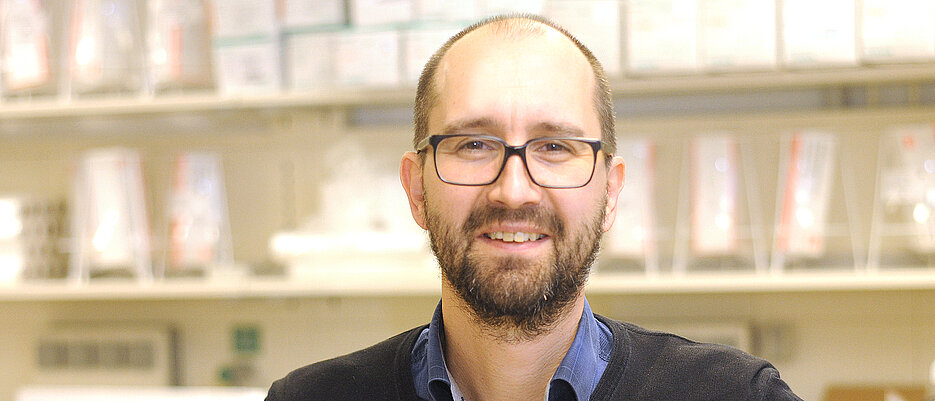The immune system under the microscope
12/05/2018Wolfgang Kastenmüller studies the development of special immune cells that show promise in treating cancer. He has now been awarded an ERC Consolidator Grant worth nearly two million euros for his research.

A little over a year ago, Professor Wolfgang Kastenmüller was appointed Chair of System Immunology I at the University of Würzburg. Together with Georg Gasteiger, who holds the Chair of System Immunology II, he leads the newly established Max Planck Research Group for Systems Immunology. Their research focuses on how the immune system interacts with the organism, especially the interaction of different cells of the immune system in local networks and with cells of other organ systems.
Kastenmüller's research efforts have now been rewarded with a EUR 1.8 million Consolidator Grant from the European Research Council ERC. The ERC gives this type of grant to "excellent researchers with a promising scientific career". It will allow Kastenmüller to advance his projects over the next five years.
How immune cells are activated
In his new research project, Kastenmüller wants to shine light on how special cells of the immune system, the "CD8" cells, are activated and regulated. Also referred to as "cytotoxic T cells", the CD8 cells are members of the lymphocyte family and have the ability to dock to target cells and trigger their cell death. This property makes them highly interesting for cancer research.
"If programmed properly, this type of T cells is suitable for immunotherapy of cancer," Wolfgang Kastenmüller explains. In fact, T cells are capable of recognising tumour cells as foreign bodies and eliminating them. But in order to do so, they have to be activated in a special manner first. The two immunologists James Allison and Tasuku Honjo won this year's Medicine Nobel Prize for discovering how to harness the body’s immune system to fight cancer. Their research led to the development of immune checkpoint inhibition which enables the immune system to attack tumours effectively. The therapy based on this principle is capable of curing formerly incurable patients.
T cells need education
"We know that these T cells are activated in a multi-stage process in the lymph nodes," Kastenmüller explains. Figuratively speaking, they do not immediately start a job after graduating from school but participate in a number of qualification measures first. Kastenmüller was able to demonstrate that the cells migrate through the lymph nodes, supported by helper cells and guided by signals, to complete various maturation steps until they are optimally developed.
The new research project aims to illuminate these steps in detail. Kastenmüller and his team want to understand the fundamental mechanisms at work and demonstrate which molecules are responsible for each development step. The scientist refers to this kind of work as fundamental research. The basic understanding of these elementary processes is the key to developing new targeted therapies according to the researcher.
The money from the Consolidator Grant will mostly be invested in new staff, consumables and in developing new experimental systems over the next five years. But a portion of the grant amount is also dedicated to upgrading the microscopy equipment. This will provide a detailed view of the immune cells, allowing the scientists to visualise how these cells move, track down and eliminate infected cells in real-time.
Two ERC Grants for the Max Planck Group
By the way, Wolfgang Kastenmüller is not the only ERC laureate at the Max Planck Research Group for Systems Immunology. Already last year, Georg Gasteiger secured a EUR 1.5 million Starting Grant (https://www.uni-wuerzburg.de/aktuelles/pressemitteilungen/single/news/georg-gasteiger-erforscht-das-immunsystem-1/). The ERC awarded the grant to fund Gasteiger's research project titled "Tissue-resident Lymphocytes: Development and Function in 'real-life' Contexts".
ERC Consolidator Grants 2018
Overall, 291 leading scientists from all over Europe received a Consolidator Grant in this year's round. 2,389 proposals had been submitted which is equivalent to a success rate of twelve percent.
38 of the 291 research projects are conducted at facilities in Germany, followed by France (32) and Switzerland (32). Only the UK were able to secure more grants with 55 successful research proposal funded. But Germany is top of the class when looking at the nationality of the project leaders: 49 research projects are led by German scientists.
Seven researchers at Bavarian universities will receive some 14 million euros for their research projects. In addition to the University of Würzburg, both universities in Munich were successful with three proposals, respectively.
Contact
Prof. Dr. Wolfgang Kastenmüller, Department of Systems Immunology I, T: +49 931 31-81816, wolfgang.kastenmueller@uni-wuerzburg.de






